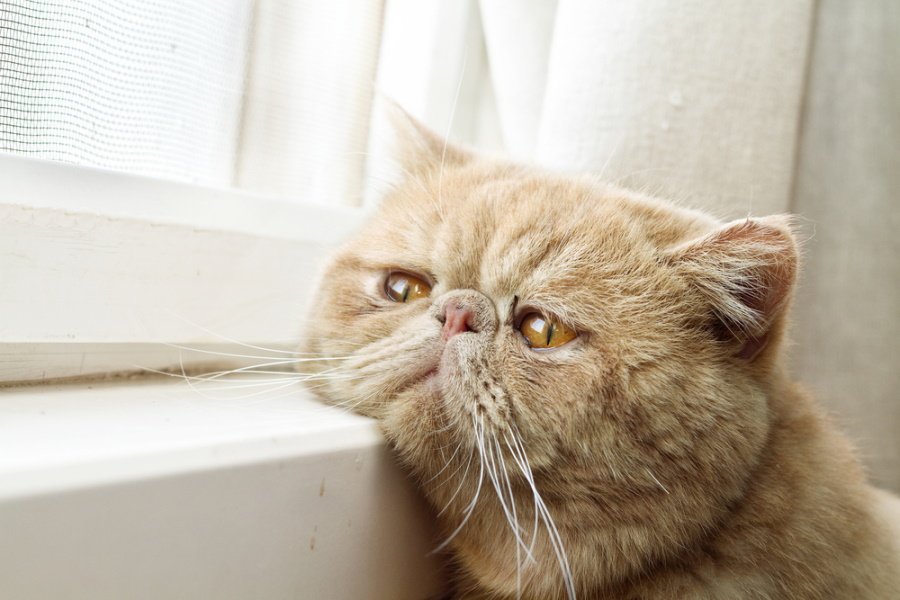Mental health is not a term that is typically associated with cats. However, as many cat owners may have observed, felines can experience changes in mood, behavior, and even exhibit signs of stress.
While cats may not experience mental health issues in the same way humans do, there are still several reasons why a cat’s mental well-being may be impacted. In this article, we will discuss the top three causes of mental health issues in cats.
Table of Contents
Is My Cat Depressed?
Some of the signs of depression or other mental health conditions in a cat include the following:
Changes in Appetite
If your cat is depressed, they may lose interest in food and have a decrease in their appetite. This could lead to significant weight loss and other health concerns.
Lethargy: Depressed cats may become inactive and uninterested in activities they once enjoyed. They may spend more time sleeping, seem less playful, or show a lack of energy.
Hiding
A depressed cat may retreat to isolated or hidden areas, such as under the bed or in a closet, and avoid socializing with family members or other pets.
Aggression
Depression can sometimes manifest as aggression in cats, causing them to lash out at people or other animals. This can include biting, scratching, hissing, or growling.
Overgrooming
Cats may overgroom themselves when depressed, leading to hair loss and other skin issues. They may also stop grooming altogether, leading to a disheveled appearance.
Vocalization
Depressed cats may meow more often or more loudly than usual, and their meows may sound more mournful or distressing.
Why Do Cats Have Mental Health Issues?
Changes in Environment and Routine
Cats are creatures of habit and routine. They thrive on stability and consistency in their daily lives. Any sudden changes in their environment or routine can be unsettling and cause stress, anxiety, and even depression. Cats can experience changes in their environment due to a move to a new home, new people or pets entering their home, or even changes to their daily routine, such as feeding times or litter box location.
Cats may respond to these changes in several ways. They may become withdrawn, hide more often, or refuse to eat. They may also become more aggressive or engage in destructive behaviors such as scratching furniture or spraying urine. As a cat owner, it is important to be aware of these changes and make adjustments to your cat’s routine gradually to help reduce stress and anxiety.
Health Issues
Physical health issues in cats can also cause changes in their mental well-being. Chronic pain, illness, or discomfort can lead to depression, anxiety, and changes in behavior. Cats may also become more irritable, aggressive, or lethargic. It is important to note that changes in behavior can be one of the first signs of a health issue in cats.
It is crucial for cat owners to ensure their cats receive regular check-ups with a veterinarian to detect any health issues early. Preventative measures such as regular grooming, flea and tick prevention, and a healthy diet can also help prevent physical health issues in cats.
Lack of Mental Stimulation
Cats are intelligent animals that need mental stimulation to keep their minds active and healthy. Cats that do not receive enough mental stimulation may become bored, depressed, or exhibit destructive behavior. Mental stimulation can come in the form of play, interaction with humans or other pets, or through toys and puzzle feeders.
A lack of mental stimulation can be especially problematic for indoor cats. Indoor cats do not have access to the same level of mental stimulation as outdoor cats, who have the opportunity to explore, hunt, and engage with their surroundings. As a cat owner, it is important to provide your cat with a variety of toys and activities to keep their minds active and engaged.
What Can I Do To Improve My Cats Mental Health?
Provide Enrichment and Playtime
One of the most effective ways to improve your cat’s mental health is to provide opportunities for enrichment and playtime. Cats are naturally curious and active animals, and they need plenty of stimulation to keep them mentally and physically healthy.
Provide your cat with plenty of toys to play with, such as puzzle feeders and scratching posts. Set aside time each day to engage in playtime with your cat, whether it’s using a feather wand or tossing a ball. This will not only help your cat stay active and entertained but also help to strengthen the bond between you and your feline companion.
Create a Safe and Comfortable Environment
Another important factor in maintaining your cat’s mental health is creating a safe and comfortable environment. This means providing your cat with a cozy bed, plenty of space to roam and explore, and a calm and stress-free environment.
Cats are sensitive animals and can become stressed or anxious in noisy or chaotic environments. Consider providing a quiet and peaceful space for your cat to retreat to when they need to rest or relax. You may also want to invest in a pheromone diffuser or spray to help your cat feel more relaxed and calm.
Maintain a Healthy Diet and Routine
A healthy diet and routine are essential for your cat’s physical and mental well-being. Make sure your cat is eating a high-quality diet that meets its nutritional needs, and provide them with plenty of fresh water.
Establish a consistent routine for feeding, playtime, and rest. Cats thrive on routine and consistency and having a predictable schedule can help to reduce stress and anxiety. Be sure to keep up with regular checkups and veterinary care to catch any potential health concerns early and keep your cat healthy and happy.
In summary, to improve your cat’s mental health, provide plenty of opportunities for enrichment and playtime, create a safe and comfortable environment, and maintain a healthy diet and routine. By taking these steps, you can help your cat stay mentally and physically healthy and enjoy a long and happy life by your side.
This article might also help:
Is Your Cat Peeing Outside the Litter Box?

Jonathon Hyjek is an entrepreneur and cat-lover. He is married to Joy and they share their home with their 2 feline-friends, Franklin & Ollie. Jonathon is a self-admitted “Crazy Cat Guy”. He started this website because of his love for his own cats and their well-being.

